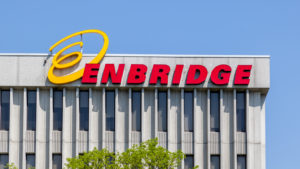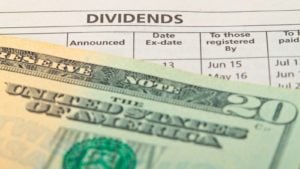While dividend yields have partially declined of late due to rallying stock prices, it’s still possible to find attractive high-yield retirement stocks on Wall Street. These businesses typically generate stable cash flow, boast strong balance sheets, and have reasonable dividend payout ratios.
As a result, these companies have the financial resilience to grow their businesses while consistently paying attractive dividends. Given the bullish momentum in this earnings season, I’ll discuss seven retirement stocks to buy with generous dividend yields.
A high-yield dividend payment is only as reliable as the business behind it. Therefore, investors should compare dividend yields among a list of potential names to buy.
With that in mind, here is a list of seven high-yield retirement stocks that should make great additions to any long-term portfolio:
- AGNC Investment (NASDAQ:AGNC)
- Annaly Capital Management (NYSE:NLY)
- Coca-Cola (NYSE:KO)
- Enbridge (NYSE:ENB)
- Horizon Technology Finance (NASDAQ:HRZN)
- Invesco High Yield Equity Dividend Achievers ETF (NASDAQ:PEY)
- McDonald’s (NYSE:MCD)
It’s important to ensure that a high-yield retirement stock candidate has a healthy balance sheet, a stable payout ratio, a history of consistent dividend increases, and steady top-line and bottom-line growth. In addition, a company ideally needs to have long-lasting competitive advantages, including high barriers to entry, high customer switching costs, a strong brand name, or advanced technology.
Retirement Stocks to Buy: AGNC Investment (AGNC)

52-week range: $13.71 — $18.84
Dividend Yield: 8.72%
Bethesda, Maryland-based AGNC Investment is a real estate investment trust (REIT) primarily investing in residential mortgage-backed securities (BMS). That means both the principal and interest payments are guaranteed by a U.S. Government-sponsored agency or the U.S. government.
AGNC released Q3 results on October 25. The company’s investment portfolio ended the quarter at $84.1 billion. Net interest income came in at $279 million. Comprehensive income stood at $193 million, or 37 cents per diluted share, compared to $707 million, or $1.15 per diluted share, in the prior-year quarter.
Of the results, CEO Peter Federico said:
“We are very pleased with AGNC’s third quarter financial results, which benefited from relatively stable market conditions during the quarter. Our very attractive 9% dividend yield, coupled with a modest increase in tangible net book value in the third quarter, drove our strong economic return of 2.3%.”
As a REIT, AGNC is required to pay 90% of taxable income back to its shareholders, implying consistent dividend payouts. The company is an investor in mortgage-related securities. As these assets are federal loans guaranteed by government-sponsored agencies, such as Fannie Mae or Freddie Mac, they have a low-risk profile.
AGNC currently offers a generous 8.7% yield, and pays 12 cents per share every month as dividends. A solid history of generous monthly dividends makes AGNC stock a safe pick for dividend investors. The stock currently hovers around $16.5 per share, and is up almost 6% year-to-date (YTD). Forward price-to-earnings (P/E) stands at 6.4x.
Annaly Capital Management (NLY)

52 week range: $6.92 — $9.64
Dividend Yield: 10.16%
New York-based Annaly Capital Management is the largest mortgage REIT by market cap, also investing in mortgage securities backed by the federal government via agencies like Fannie Mae and Freddie Mac.
Annaly announced Q3 results on October 27. It reported GAAP net income of 34 cents per share for the quarter, down from 70 cents in the prior-year quarter. Earnings available for distribution came in at 28 cents per share, down 2 cents quarter-over-quarter. Annualized GAAP return on average equity stood at 15.3%.
“We are pleased with our third quarter results, which generated a positive economic return for shareholders and earnings available for distribution that continued to provide ample coverage for our current dividend,” CEO David Finkelstein remarked. “Ultimately, we are well-poised to take advantage of opportunities that arise as the Federal Reserve shrinks its footprint in the mortgage market given our prudent portfolio construction, historically low leverage and substantial liquidity.”
Annaly profits from the spread between the average yield it receives between mortgage securities and cost of borrowing. Hence, interest rates play a vital role in bottom line performance. Low-interest rates usually encourage customers to refinance their higher-rate mortgages for lower-rate ones. As a result, management anticipates an increase in its net interest margin in the near term.
NLY stock offers a 10.1% dividend yield. That double-digit dividend yield and stable cash flow make NLY a potentially robust retirement stock for long-term investors. The stock hovers at around $8.70, up 3% YTD and 22% over the past year. Shares trade at almost 8x forward earnings.
Coca-Cola (KO)

52-week range: $47.30 — $57.56
Dividend Yield: 3.02%
Atlanta, Georgia-based Coca-Cola is the largest nonalcoholic beverage entity worldwide, producing and marketing well-known carbonated beverage brands. They include Coke, Fanta, and Sprite, as well as non-sparkling brands, such as Minute Maid, Costa, and Georgia Coffee, and energy products such as PowerAde and Smartwater.
Coca-Cola released Q3 results on Oct. 27. Revenue went up by 16% YOY to $10 billion. Net income for the third quarter came in at $2.47 billion, or 57 cents per diluted share, up from $1.74 billion, or 40 cents per diluted share, in the prior-year quarter. EPS grew 41% YOY to 57 cents, while non-GAAP EPS surged 18% to 65 cents. YTD free cash flow stood at $8.5 billion, up $3 billion compared to the prior year.
Following the announcement, CEO James Quincey remarked:
“We are updating our full-year guidance to reflect another quarter of momentum in the business. While the recovery continues to be asynchronous around the world, we are investing for growth to drive long-term value for the system.”
Coca-Cola continues to benefit from the global economic recovery. The company still has significant growth potential as it generates around 40% of its revenue from developing markets, where we see low per-capita soft drink consumption. Moreover, Coca-Cola has diversified its beverage portfolio, appealing to different tastes.
Given its broad distribution network and global scale, KO stock should continue to generate lucrative returns for income-oriented investors. The company boasts roughly 60 years of consecutive dividend hikes. KO stock currently supports a dividend yield of 3%. It hovers slightly above $55, up only 1.5% YTD. Shares are trading at 22.3x forward earnings and 6.5x trailing sales.
Enbridge (ENB)

52-week range: $26.97 — $43.21
Dividend Yield: 6.22%
Canada-based Enbridge is a leading energy infrastructure company in North America. The group owns extensive midstream assets transporting hydrocarbons across the U.S. and Canada. Its pipeline network includes the Canadian Mainline system, oil and natural gas pipelines, natural gas utilities, and renewable energy facilities.
Enbridge released Q2 results in late July. Adjusted earnings surged 20% YOY to $1.4 billion or 67 cents per share, up from $1.1 billion, or 56 cents per share, in the prior-year quarter. Distributable cash flow came in at $2.5 billion.
CEO Al Monaco remarked, “We’re on track to bring $10 billion of projects into service this year and we’re reaffirming our full year 2021 financial guidance.”
Driven by a significant backlog of expansion projects, management anticipates increasing cash flow per share at an annual rate of 5% to 7% through 2023. In addition, the company is on track to transition its business toward cleaner alternatives. For instance, the energy group is building wind and solar assets in Europe and taking on low-carbon projects such as renewable natural gas and hydrogen.
Enbridge has been a lucrative dividend stock over the years, currently offering a 6.2% dividend yield. The company has increased its payout every year over the past 26 years. ENB stock currently sits around $42 territory, up 33% YTD. Shares are trading at 17.2x forward earnings and 2.5x sales.
Horizon Technology Finance (HRZN)

52-week range: $11.03 — $17.95
Dividend Yield: 7.01%
Farmington, Connecticut-based Horizon Technology Finance is a specialty finance company that lends to and invests in development-stage companies in the technology, life science, healthcare information and services, and sustainability industries.
Horizon Technology released Q3 results on October 26. Total investment portfolio increased 45% YOY to $452 million. Total investment income grew 33% to $16.4 million, compared to $12.3 million for the prior-year quarter. Net investment income was $8.0 million, or 40 cents per share, compared to $5.9 million, or 34 cents per share, a year ago. Horizon had $88.1 million in available liquidity, consisting of $42.9 million in cash and money market funds.
CEO Robert D. Pomeroy, Jr. remarked, “We had an excellent third quarter, as HRZN generated net investment income of $0.40 per share, significantly grew its portfolio and increased its NAV per share.”
Horizon’s loan portfolio to venture-stage clients continues to grow, with a record level of new loans closed during the third quarter. Management is primarily focused on life sciences and biotechnology enterprises. The company has managed to decrease its own cost of capital as it rolled over debt and raised money via its at-the-market offering.
HRZN stock is hovering around $17 per share, up 29% YTD and 46% over the past year. Current prices support a generous 7% dividend yield. Shares are trading at 12.6x forward earnings and 20.6x trailing sales.
Invesco High Yield Equity Dividend Achievers ETF (PEY)

52-Week Range: $14.35 — $21.85
Dividend Yield: 3.85%
Expense Ratio: 0.53% per year
Our next choice is an exchange-traded fund (ETF). The Invesco High Yield Equity Dividend Achievers ETF invests in 52 stocks selected on the basis of dividend yield and steady growth in dividends. PEY tracks the returns of the NASDAQ US Dividend Achievers 50 Index. Both the fund and the index are reconstituted annually in March. Then, they are rebalanced quarterly in March, June, September, and December.
PEY started trading in December 2004. The top 10 names account for around 30% of net assets of $981 million. In terms of the sub-sectoral breakdown, we see financials (23.67%), followed by utilities (22.71%), consumer staples (16.94%), and energy (14.16%).
Leading holdings on the roster include mid-stream service provider Oneok (NYSE:OKE), oil major Exxon Mobil (NYSE:XOM), petroleum refiner and distributor of transportation fuels Valero Energy (NYSE:VLO), telecommunications giant AT&T (NYSE:T), Northwest Bancshares (NASDAQ:NWBI) and Altria (NYSE:MO).
The fund returned 17.2% YTD, hitting an all-time high in May. PEY’s P/E and price-to-book (P/B) ratios stand at 14.2x and 1.8x.
McDonald’s (MCD)

52-week range: $202.73 — $249.95
Dividend Yield: 2.30%
As the largest restaurant owner-operator worldwide, McDonald’s needs little introduction. The company boasts 2020 systemwide sales of $93 billion across 39,000 stores and 119 countries. Wall Street concurs that McDonald’s transformed the fast-food industry with a convenient and low-cost menu. The group has grown its global footprint via partnerships with independent restaurant franchisees.
McDonald’s issued Q3 results on October 27. Consolidated revenue grew by 14% YOY to $6.20 billion. Systemwide sales increased 16% to $29.95 billion. Net income went up 22% YOY to 2.15 billion, or $2.86 per diluted share, up from $1.76 billion, or $2.35 per diluted share, in the prior-year period.
Following the release of the metrics, CEO Chris Kempczinski cited:
“Our third quarter results are a testament to our unparalleled scale and agility. Our global comparable sales increased 10% over 2019, which was delivered across an omnichannel experience that is focused on meeting the needs of our customers.”
Despite a global trend that shifts towards healthier eating, McDonald’s cost-conscious menu should continue to generate robust returns to shareholders. In addition, its recent endeavor into delivery and loyalty programs provides a significant tailwind to drive top-line growth in the long term.
MCD has a renowned history of increasing long-term shareholder value. Its dividend payouts have surged consistently for over 40 years, with at least one dividend hike every year. The company declared a 7% increase in its quarterly cash dividend to $1.38 per share and announced that it would soon resume its share repurchase program.
MCD stock currently trades at slightly above $240 per share, up 13% so far this year. Shares are trading at 24x forward earnings and 8.2x sales.
On the date of publication, Tezcan Gecgil did not have (either directly or indirectly) any positions in the securities mentioned in this article. The opinions expressed in this article are those of the writer, subject to the InvestorPlace.com Publishing Guidelines.
Tezcan Gecgil, Ph.D., has worked in investment management for over two decades in the U.S. and U.K. In addition to formal higher education in the field, she has also completed all three levels of the Chartered Market Technician (CMT) examination. Her passion is for options trading based on technical analysis of fundamentally strong companies. She especially enjoys setting up weekly covered calls for income generation.
